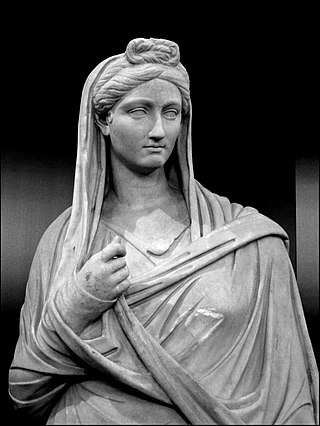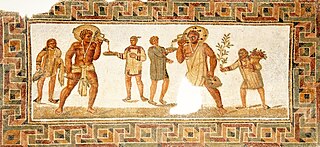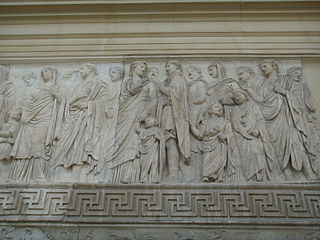
Roman law is the legal system of ancient Rome, including the legal developments spanning over a thousand years of jurisprudence, from the Twelve Tables, to the Corpus Juris Civilis ordered by Eastern Roman emperor Justinian I. Roman law forms the basic framework for civil law, the most widely used legal system today, and the terms are sometimes used synonymously. The historical importance of Roman law is reflected by the continued use of Latin legal terminology in many legal systems influenced by it, including common law.

Praetor, also pretor, was the title granted by the government of Ancient Rome to a man acting in one of two official capacities: (i) the commander of an army, and (ii) as an elected magistratus (magistrate), assigned to discharge various duties. The functions of the magistracy, the praetura (praetorship), are described by the adjective itself: the praetoria potestas, the praetorium imperium, and the praetorium ius, the legal precedents established by the praetores (praetors). Praetorium, as a substantive, denoted the location from which the praetor exercised his authority, either the headquarters of his castra, the courthouse (tribunal) of his judiciary, or the city hall of his provincial governorship. The minimum age for holding the praetorship was 39 during the Roman Republic, but it was later changed to 30 in the early Empire.

Manumission, or enfranchisement, is the act of freeing slaves by their owners. Different approaches to manumission were developed, each specific to the time and place of a particular society. Historian Verene Shepherd states that the most widely used term is gratuitous manumission, "the conferment of freedom on the enslaved by enslavers before the end of the slave system".
The pater familias, also written as paterfamilias, was the head of a Roman family. The pater familias was the oldest living male in a household, and could legally exercise autocratic authority over his extended family. The term is Latin for "father of the family" or the "owner of the family estate". The form is archaic in Latin, preserving the old genitive ending in -ās, whereas in classical Latin the normal first declension genitive singular ending was -ae. The pater familias always had to be a Roman citizen.

Freeborn women in ancient Rome were citizens (cives), but could not vote or hold political office. Because of their limited public role, women are named less frequently than men by Roman historians. But while Roman women held no direct political power, those from wealthy or powerful families could and did exert influence through private negotiations. Exceptional women who left an undeniable mark on history include Lucretia and Claudia Quinta, whose stories took on mythic significance; fierce Republican-era women such as Cornelia, mother of the Gracchi, and Fulvia, who commanded an army and issued coins bearing her image; women of the Julio-Claudian dynasty, most prominently Livia and Agrippina the Younger, who contributed to the formation of Imperial mores; and the empress Helena, a driving force in promoting Christianity.

Various lists regarding the political institutions of ancient Rome are presented. Each entry in a list is a link to a separate article. Categories included are: constitutions (5), laws (5), and legislatures (7); state offices (28) and office holders ; political factions and social ranks (8). A political glossary (35) of similar construction follows.

Citizenship in ancient Rome was a privileged political and legal status afforded to free individuals with respect to laws, property, and governance. Citizenship in Ancient Rome was complex and based upon many different laws, traditions, and cultural practices. There existed several different types of citizenship, determined by one's gender, class, and political affiliations, and the exact duties or expectations of a citizen varied throughout the history of the Roman Empire.
The ius gentium or jus gentium is a concept of international law within the ancient Roman legal system and Western law traditions based on or influenced by it. The ius gentium is not a body of statute law nor a legal code, but rather customary law thought to be held in common by all gentes in "reasoned compliance with standards of international conduct".

Latin rights were a set of legal rights that were originally granted to the Latins under Roman law in their original territory and therefore in their colonies. "Latinitas" was commonly used by Roman jurists to denote this status. With the Roman expansion in Italy, many settlements and coloniae outside of Latium had Latin rights.
The Lex Aelia Sentia was a law established in ancient Rome in 4 AD. It was one of the laws that the Roman assemblies passed at the behest of the emperor Augustus. Along with the Lex Fufia Caninia, this law placed limitations on the manumission of slaves.

Social class in ancient Rome was hierarchical, with multiple and overlapping social hierarchies. An individual's relative position in one might be higher or lower than in another, which complicated the social composition of Rome.

Slavery in ancient Rome played an important role in society and the economy. Unskilled or low-skill slaves labored in the fields, mines, and mills with few opportunities for advancement and little chance of freedom. Skilled and educated slaves—including artisans, chefs, domestic staff and personal attendants, entertainers, business managers, accountants and bankers, educators at all levels, secretaries and librarians, civil servants, and physicians—occupied a more privileged tier of servitude and could hope to obtain freedom through one of several well-defined paths with protections under the law. The possibility of manumission and subsequent citizenship was a distinguishing feature of Rome's system of slavery, resulting in a significant and influential number of freedpersons in Roman society.

Ius or Jus in ancient Rome was a right to which a citizen (civis) was entitled by virtue of his citizenship (civitas). The iura were specified by laws, so ius sometimes meant law. As one went to the law courts to sue for one's rights, ius also meant justice and the place where justice was sought.
A freedman or freedwoman is a formerly enslaved person who has been released from slavery, usually by legal means. Historically, slaves were freed by manumission, emancipation, or self-purchase. A fugitive slave is a person who escaped enslavement by fleeing.
The leges regiae were early Roman laws, which classical historians, such as Plutarch, mentioned had been introduced by the Kings of Rome.
Liberto is both a given name and a surname of Italian origin.

The ancient Roman family was a complex social structure based mainly on the nuclear family, but could also include various combinations of other members, such as extended family members, household slaves, and freed slaves. Ancient Romans had different names to describe their concept of family, including "familia" to describe the nuclear family and "domus" which would have included all the inhabitants of the household. The types of interactions between the different members of the family were dictated by the perceived social roles each member played. An ancient Roman family's structure was constantly changing as a result of the low life expectancy and through marriage, divorce, and adoption.

Contubernium was a quasi-marital relationship in ancient Rome between two slaves or between a slave (servus) and a free citizen who was usually a former slave or the child of a former slave. A slave involved in such a relationship was called contubernalis, the basic and general meaning of which was "companion."

Freedmen in ancient Rome existed as a distinct social class (liberti), with former slaves granted freedom and rights through the legal process of manumission. The Roman practice of slavery utilized slaves for both production and domestic labour, overseen by their wealthy masters. Urban and domestic slaves especially could achieve high levels of education, acting as agents and representatives of their masters' affairs and finances. Within Roman law there was a set of practices for freeing trusted slaves, granting them a limited form of Roman Citizenship or Latin Rights. These freed slaves were known in Latin as liberti (freedmen), and formed a class set apart from freeborn Romans. While freedmen were barred from most forms of social mobility in Roman society, many achieved high levels of wealth and status. The legal and social status of freedmen remained a point of cultural and legal contention throughout the Republic and Empire.
Inheritance law in ancient Rome was the Roman law that governed the inheritance of property. This law was governed by the civil law of the Twelve Tables and the laws passed by the Roman assemblies, which tended to be very strict, and law of the praetor, which was often more flexible. The resulting system was extremely complicated and was one of the central concerns of the whole legal system. Discussion of the laws of inheritance take up eleven of the fifty books in the Digest. 60-70% of all Roman litigation was concerned with inheritance.











